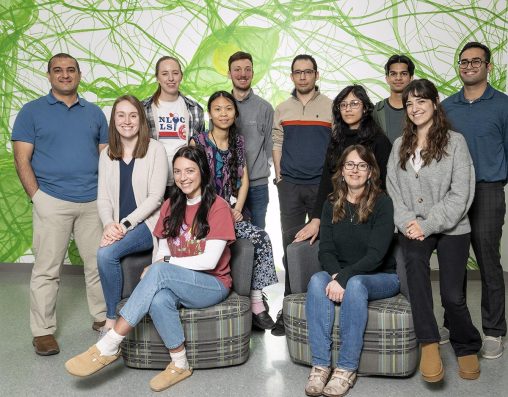
Researchers in the lab of Sherif Elbasiouny, the Wright State University and Premier Health endowed chair in neurodegenerative diseases research, are expanding their investigation of the possible causes of amyotrophic lateral sclerosis, or ALS. (Photo by Erin Pence)
A new federal grant will allow Wright State University researchers to expand their study of the disease mechanisms of amyotrophic lateral sclerosis, or ALS, a fatal neurodegenerative disease.
The research is led by Sherif M. Elbasiouny, Ph.D., the Wright State University and Premier Health endowed chair in neurodegenerative diseases research, director of neuroengineering education and research, and professor of neuroscience, cell biology and physiology.
The five-year $3.1 million award is from the National Institute of Neurological Disorders and Stroke and the National Institute on Aging, which are part of the National Institutes of Health.
It is the second active grant Elbasiouny has received from the federal agency, expanding his research into ALS and extending the lab’s federal funding for ALS research from 2015 until 2028.
Researchers in Elbasiouny’s Neuro Engineering, Rehabilitation and Degeneration (N.E.R.D.) Laboratory are examining how the neurons that control muscles degenerate in ALS patients.
In the new project, Elbasiouny and his collaborators will examine a new animal model to determine whether dysfunction in potassium channels in the cell membranes of neurons could cause ALS in patients.
Elbasiouny previously found this dysfunction can kill motoneurons in the spinal cord of ALS patients.
“We characterized some dysfunction in the standard animal model, and now we’re moving into this new animal model to see if these dysfunctions are in the new model,” he said.
The researchers will compare their findings from their previous study to improve their understanding of the causes of ALS.
The research project employs the lab’s unique expertise in combining engineering and neuroscience techniques, analytical tools and computer simulations.
Elbasiouny has joint appointments in Wright State’s Boonshoft School of Medicine, College of Science and Mathematics, and College of Engineering and Computer Science, where he is a professor in the Department of Biomedical, Industrial and Human Factors Engineering.
“The multidisciplinary nature of our investigation is unique,” he said.
The exact cause of ALS is not yet known, and identifying its cause is critical to developing a cure and effective treatments to halt the progression of the disease.
ALS starts with the progressive loss of muscle function, followed by paralysis and ultimately death due to the inability to breathe. Most people with ALS die within three to five years from when symptoms first appear. It is commonly known as Lou Gehrig’s disease for the New York Yankees star who died from the disease.
Elbasiouny’s lab is also pursuing several other research projects related to ALS.
The researchers are examining whether potassium dysfunction could cause frontotemporal dementia in ALS patients. In addition to losing muscle function, 30% of ALS patients are diagnosed with dementia.
The researchers have also started a human study to identify a novel biomarker to help speed up diagnosis in ALS patients. There is no specific test to diagnose ALS, and its symptoms often overlap with other neurological diseases, delaying the time it takes to make a diagnosis.
The Midwest has the highest prevalence of ALS in the United States, and Ohio has the second highest number of ALS patients in the country, behind Michigan.
“This research is important to Ohio,” Elbasiouny said. “We should care about this. We need to think about this more deeply because many people in the state have ALS.”
Elbasiouny earned his Ph.D. in neuroscience at the University of Alberta in Edmonton, Canada, and his bachelor’s and master’s degrees in biomedical engineering from Cairo University in Egypt.
He joined the faculty at Wright State in 2012 after a postdoctoral training appointment at Northwestern University.
He received the 2023 Brage Golding Distinguished Professor of Research Award, a 2015 Presidential Award for Faculty Excellence: Early Career Achievement and an Excellence in Grantsmanship Award from Wright State.

 Wright State alum Lindsay Aitchison fulfills childhood space-agency dream
Wright State alum Lindsay Aitchison fulfills childhood space-agency dream  Wright State business professor, alumnus honored by regional technology organizations
Wright State business professor, alumnus honored by regional technology organizations  Wright State University Foundation awards 11 Students First Fund projects
Wright State University Foundation awards 11 Students First Fund projects  Gov. DeWine reappoints Board Treasurer Beth Ferris and names student Ella Vaught to Wright State Board of Trustees
Gov. DeWine reappoints Board Treasurer Beth Ferris and names student Ella Vaught to Wright State Board of Trustees  Joe Gruenberg’s 40-Year support for Wright State celebrated with Honorary Alumnus Award
Joe Gruenberg’s 40-Year support for Wright State celebrated with Honorary Alumnus Award 